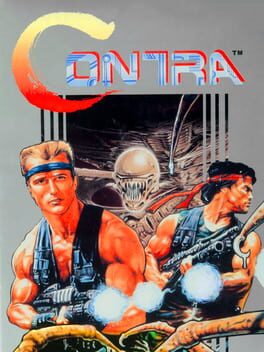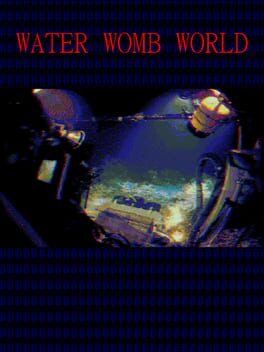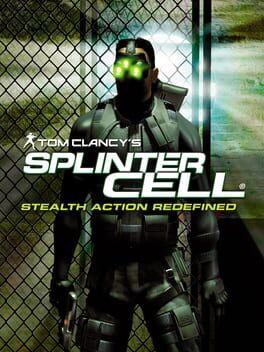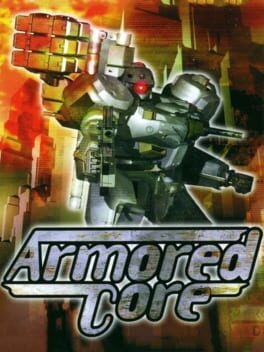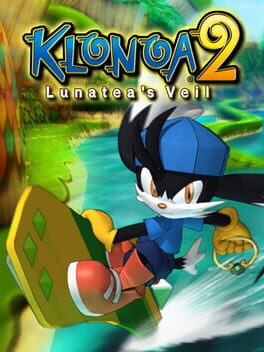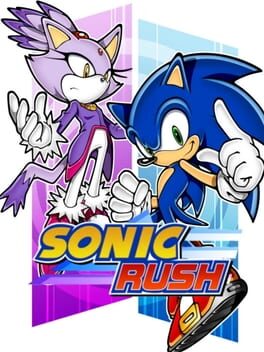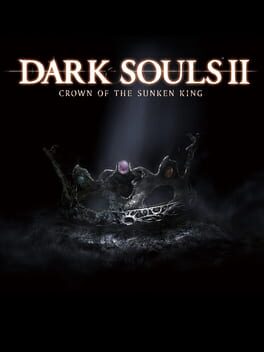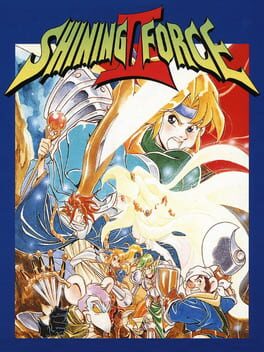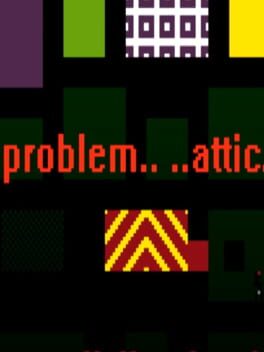Josh15
722 Reviews liked by Josh15
Contra
1988
Todos saben que este juego es bueno. pero siento que no saben que tan bueno es. A pesar de su famosa dificultad el juego quiere que triunfes, Todos los desafíos están bien pensados y el juego te pone en frente las armas que necesitas para triunfar, es un Gocé descubrir lo lejos que puedes llegar con pura habilidad.
Cookie Clicker
2013
i, for one, am thoroughly appalled that this series would ever have the audacity to feature a player character who isn't a totally morally righteous person. this is a travesty. completely out of touch
and the gameplay? it's such a shameless ripoff of the last acclaimed silent hill project that was released. what the fuck were they thinking?
i'm going to go return to silent hill 2 now - the most subtle and least blunt horror game ever created. at least that game doesn't have sticky notes with "bullying" written on them (granted, this one doesn't either, but that's not what i heard from the people who didn't play it, so it must be true)
and the gameplay? it's such a shameless ripoff of the last acclaimed silent hill project that was released. what the fuck were they thinking?
i'm going to go return to silent hill 2 now - the most subtle and least blunt horror game ever created. at least that game doesn't have sticky notes with "bullying" written on them (granted, this one doesn't either, but that's not what i heard from the people who didn't play it, so it must be true)
Water Womb World
2020
Entre esto, The Well y Vía Negativa, empiezo a considerar a Yames une artista de pocas temáticas y muchas ideas. Donde el primer juego tanteaba con los elementos de una novela gótica clásica, y Vía Negativa trata de presentarse como una versión retorcida del sacrificio de Job, Water Womb World es, a mi parecer, la obra suya que más reconoce sus raíces lovecraftianas. A decir verdad, hay historias en los Mitos de Cthulhu que se leen prácticamente igual si excusas el componente religioso.
Como ya he dicho, creo que Yames es un poco de piñón fijo, pero mientras la estética y la presentación me entren, estaré dispuesto a excusarlo. Y aquí lo que me ha entrado es la interfaz de PC-98 que lo impregna todo. Con todo, hecho en falta un poquito más de variedad.
----------------------
Between this, The Well and Via Negativa, I'm beginning to see Yames as an artist with few themes but many ideas. Whereas the first game tinkered with the tropes of a gothic novel, and Via Negativa is like a twisted version of Job's sacrifice, Water Womb World is the one work of his that sits closer to Lovecraft. Truth be told, there are stories in the Cthulhu Myths that read pretty much the same minus the religious component.
As I said, I think Yames is a bit of a one trick pony, but as long as the aesthetics and presentation suit me I'll be willing to play. The PC-98 interface is what did it for me this time, but I missed some variety in the end.
Como ya he dicho, creo que Yames es un poco de piñón fijo, pero mientras la estética y la presentación me entren, estaré dispuesto a excusarlo. Y aquí lo que me ha entrado es la interfaz de PC-98 que lo impregna todo. Con todo, hecho en falta un poquito más de variedad.
----------------------
Between this, The Well and Via Negativa, I'm beginning to see Yames as an artist with few themes but many ideas. Whereas the first game tinkered with the tropes of a gothic novel, and Via Negativa is like a twisted version of Job's sacrifice, Water Womb World is the one work of his that sits closer to Lovecraft. Truth be told, there are stories in the Cthulhu Myths that read pretty much the same minus the religious component.
As I said, I think Yames is a bit of a one trick pony, but as long as the aesthetics and presentation suit me I'll be willing to play. The PC-98 interface is what did it for me this time, but I missed some variety in the end.
Queer Power
2004
As a stealth system, it's much less uncomfortable than the one in both Metal Gears released for the PS2, but that's pretty much where its novelty ends. Way too straightforward and rigid for its own good, it stays more or less static for the whole playthrough and never escalates, with just a few set pieces where the game asks you to do different stuff. Gimmicky set pieces. It is also heavily reliant on trial and error. You act the same way at the end as you did at the start. A really, really narrow and straight hallway with nothing else to do. There isn't much else to say honestly, as it lacks any ambition whatsoever.
The story is as basic and post-9/11 as you can get. Terrorist threats, bombs, espionage, conspiracies. Pretty standard stuff. Still, it kept me engaged to binge it in like four days, but had it been a film, it would perfectly be the kind of movie you could find zapping on TV after dinner. The kind of movie you watch out of boredom and forget about it in a week. Using the darkness to your advantage is a neat idea, you make a lot of use of the couple of functions the goggles have and the gameplay never stops, which emphasizes the immersion, a necessary thing for a game like this, and the devs don't waste the opportunity to make some fun situations, but those are the only interesting things the game has going for it. One of the most aggressively average games ever made.
The story is as basic and post-9/11 as you can get. Terrorist threats, bombs, espionage, conspiracies. Pretty standard stuff. Still, it kept me engaged to binge it in like four days, but had it been a film, it would perfectly be the kind of movie you could find zapping on TV after dinner. The kind of movie you watch out of boredom and forget about it in a week. Using the darkness to your advantage is a neat idea, you make a lot of use of the couple of functions the goggles have and the gameplay never stops, which emphasizes the immersion, a necessary thing for a game like this, and the devs don't waste the opportunity to make some fun situations, but those are the only interesting things the game has going for it. One of the most aggressively average games ever made.
Armored Core
1997
unapproachable, but pretty fun and rewarding once you've got the controls/customization down. a promising start for sure
upon further thought i'm changing this from a 7 to an 8 because i still remember so much about this game and its missions. definitely the highlight of gen 1 with lots of variety and lots of ambition. the finale is legendary too
upon further thought i'm changing this from a 7 to an 8 because i still remember so much about this game and its missions. definitely the highlight of gen 1 with lots of variety and lots of ambition. the finale is legendary too
This whole game is just Klonoa bringing sorrow to Lunatea because of the emotional trauma after Phantomille, that's why the last levels have the OST from the first game mixed all in a distorted sense, the villain is a mix of Klonoa's body and Huepows green blue and gold colors, Klonoa is the only one that hears those cries for help...and the OST from that level is called Hyuponia!!!!!
Klonoa is a duology about loss, sadness and dreams, Klonoa is us, and just like him we learn to live in a world with sorrow, we're sad about the ending of Klonoa 1, but all the players remember the ending from that game, it's that sadness that makes us remember that moment, that world, that dream.
Every person has different ways of coping with these emotions, just like every kingdom in Lunatea with stuff like games, war, just thinking about the past and not moving forward, we try to ignore these bad feelings, but we have to embrace sorrow, after embracing it we're able to save this world, this dream, and wake up from this long dream, our dream.
After finishing this game, us and Klonoa, are able to wake up, good morning player!
Klonoa is a duology about loss, sadness and dreams, Klonoa is us, and just like him we learn to live in a world with sorrow, we're sad about the ending of Klonoa 1, but all the players remember the ending from that game, it's that sadness that makes us remember that moment, that world, that dream.
Every person has different ways of coping with these emotions, just like every kingdom in Lunatea with stuff like games, war, just thinking about the past and not moving forward, we try to ignore these bad feelings, but we have to embrace sorrow, after embracing it we're able to save this world, this dream, and wake up from this long dream, our dream.
After finishing this game, us and Klonoa, are able to wake up, good morning player!
Sonic Rush
2005
Las vagas similitudes de Dark Souls 2 con la saga King's Field solo sacan a relucir el deterioro en el diseño vertebral de estos juegos. Donde antes el protagonismo estaba en el lugar, ahora lo está en la acción. Donde antes se buscaba ponerte en los pies de un aventurero y actuar en primera persona, ahora se limitan a saturar el pasillo al siguiente atajo de enemigos en sus estudiadas posiciones. Poco queda de la espeleología de la saga prima, aunque se ven retazos. Se intuyen paralelismos en los golems del bosque renacidos en árboles o en la imagen de un rey Vendrick consumido en su soledad (en Dark Souls 3 habrían convertido este encuentro en una pelea multifásica). Existen ecos de cierta ciudad subterránea en esta aventura suplementaria, donde buscamos la corona de un rey olvidado en lo profundo de un templo custodiado por un dragón. Cuando pisamos una placa que activa una trampa o accionamos con una flecha un mecanismo que descubre un pasadizo secreto, nos viene el lejano recuerdo de cuando éramos arqueólogos y no guerreros.
completely unjustifiable and anarchic. what we have in FSR is a surrealist pseudosequel to a 1999 visual novel that was not localized at the time that FSR was, making the game upon original release borderline incomprehensible. compelling analysis can still be written without knowledge of the silver case, but the vast majority have settled into a comfortable deconstructionist lens - austin walkers interpretation is one such prominent take, evincing the game's dissatisfactory DS implementations (useless bonus puzzles, step counter) as part and parcel of the game's antagonistic design, antithetical to its own industry ('It's mean. It's cruel. I kind of love it.')
despite this, one of the most beautiful games ever and the work of someone i am increasingly convinced by the day is one of the most valuable devs in the industry. masterful in tone and delivery, FSR sharply threads together various disparate narrative and thematic strands to excellent effect, resulting in an anti-game package that stands head and shoulders above the crowd by closely resembling something akin to video game poetry. what does FSR pontificate on, if not to act the provocateur or to senselessly challenge convention? in no short order: truth, mystery, identity, purity, artifice, colonialism, primitivism, paradise, death, rebirth, spirituality. the influence of kafka, jodorowsky, and lynch, for example, is felt strongly, but never so strong that it is cynical or unoriginal - to be ensnared in suda's mosaic of cultural references is only to gain appreciation for the ingenuity of his work.
i think FSR and NMH's reputations precede them such that suda is seen as a figure whose sole developmental shtick lies in deconstruction and satire, but FSR is so much more than that - it only requires the player to ascend to match its level, to bask in the sunlight and take solace in ocean waves, to intuit what can't be sensed through mere deduction and speculation. truth is, after all, as natural, forthcoming, and innate as the bright blue skies around us, sometimes.
despite this, one of the most beautiful games ever and the work of someone i am increasingly convinced by the day is one of the most valuable devs in the industry. masterful in tone and delivery, FSR sharply threads together various disparate narrative and thematic strands to excellent effect, resulting in an anti-game package that stands head and shoulders above the crowd by closely resembling something akin to video game poetry. what does FSR pontificate on, if not to act the provocateur or to senselessly challenge convention? in no short order: truth, mystery, identity, purity, artifice, colonialism, primitivism, paradise, death, rebirth, spirituality. the influence of kafka, jodorowsky, and lynch, for example, is felt strongly, but never so strong that it is cynical or unoriginal - to be ensnared in suda's mosaic of cultural references is only to gain appreciation for the ingenuity of his work.
i think FSR and NMH's reputations precede them such that suda is seen as a figure whose sole developmental shtick lies in deconstruction and satire, but FSR is so much more than that - it only requires the player to ascend to match its level, to bask in the sunlight and take solace in ocean waves, to intuit what can't be sensed through mere deduction and speculation. truth is, after all, as natural, forthcoming, and innate as the bright blue skies around us, sometimes.
Shining Force II
1993
This time I'll just post my Spanish ramblings from Twitter.
https://x.com/DaniCanovasLoto/status/1749920135865930002?s=20
https://x.com/DaniCanovasLoto/status/1753095404189896890?s=20
https://x.com/DaniCanovasLoto/status/1749920135865930002?s=20
https://x.com/DaniCanovasLoto/status/1753095404189896890?s=20
Celeste
2018
Un juego de plataformas aceptable que te induce, de forma maligna, a un estilo de juego determinista y rígido, en el que la solución a cualquier desafío consiste en encontrar la combinación de inputs exacta que la persona detrás del nivel pensó en el momento. Junto a este estilo de progresión que, todo sea dicho, escala de una forma muy suave, se nos narra una historia de superación que se vale de su creciente dificultad y se aúpa con diálogos, escenas y personajes que recuerdan a un capítulo mediano de Steven Universe.
Personalmente no veo claro que el juego dedique tanto texto y momentos específicos cuando la premisa misma del plataformas kaizo al que esta obra se integra ya se basa en transmitir deseos de superación mediante sus retos. Pero más allá de eso, mi problema principal con este juego es más mecánico que otra cosa, y mi sospecha de que el juego se estaba quedando sin fuelle terminó de confirmarse con el capítulo 8 y las Caras B. Al final, todos los plataformas vuelven a Mario, sobre todo cuando no son capaces de desarrollar una identidad fuerte.
Como punto de comparación, recomendaría algo como Downwell, un juego también muy difícil pero que se asienta en la idea de dejarte desarrollar tu propia estrategia, o Super Hexagon, un juego extremadamente rígido pero extremadamente corto también. Ambos tienen lecciones que enseñar a este género que creo que Celeste haría bien en aprender.
----------------------------------------
A decent platformer that wickedly guides you into a rigid, deterministic style of gameplay where the solution to every challenge winds down to figuring out the exact input combination that whoever who designed the level thought at the time. Along with this style of progression, which, it must be said, scales very smoothly, we have a story of overcoming that makes use of its increasing difficulty and is peppered with dialogues, scenes and characters reminiscent of a mid Steven Universe episode.
Personally, I don't see why the game devotes so much text and space to its story when the very premise of the kaizo platformer is based on overcoming ever-increasing challenges. But beyond that, my main problem with this game is more mechanical than anything else. My suspicion that the game was running out of steam was confirmed with chapter 8 and the B Faces. In the end, all platformers revert back to Mario, especially if they're are unable to develop a strong identity.
As a point of comparison, I would recommend something like Downwell, a game that's very difficult but relies on letting you develop your strategy, or Super Hexagon, a game that is extremely rigid but extremely short as well. Both have lessons to teach to this genre that I think Celeste could learn.
Personalmente no veo claro que el juego dedique tanto texto y momentos específicos cuando la premisa misma del plataformas kaizo al que esta obra se integra ya se basa en transmitir deseos de superación mediante sus retos. Pero más allá de eso, mi problema principal con este juego es más mecánico que otra cosa, y mi sospecha de que el juego se estaba quedando sin fuelle terminó de confirmarse con el capítulo 8 y las Caras B. Al final, todos los plataformas vuelven a Mario, sobre todo cuando no son capaces de desarrollar una identidad fuerte.
Como punto de comparación, recomendaría algo como Downwell, un juego también muy difícil pero que se asienta en la idea de dejarte desarrollar tu propia estrategia, o Super Hexagon, un juego extremadamente rígido pero extremadamente corto también. Ambos tienen lecciones que enseñar a este género que creo que Celeste haría bien en aprender.
----------------------------------------
A decent platformer that wickedly guides you into a rigid, deterministic style of gameplay where the solution to every challenge winds down to figuring out the exact input combination that whoever who designed the level thought at the time. Along with this style of progression, which, it must be said, scales very smoothly, we have a story of overcoming that makes use of its increasing difficulty and is peppered with dialogues, scenes and characters reminiscent of a mid Steven Universe episode.
Personally, I don't see why the game devotes so much text and space to its story when the very premise of the kaizo platformer is based on overcoming ever-increasing challenges. But beyond that, my main problem with this game is more mechanical than anything else. My suspicion that the game was running out of steam was confirmed with chapter 8 and the B Faces. In the end, all platformers revert back to Mario, especially if they're are unable to develop a strong identity.
As a point of comparison, I would recommend something like Downwell, a game that's very difficult but relies on letting you develop your strategy, or Super Hexagon, a game that is extremely rigid but extremely short as well. Both have lessons to teach to this genre that I think Celeste could learn.
My House
2023
Problem Attic
2013
The problem and solution don't feel concrete, but it starts out resembling a fairly simple chain of rooms that can be grasped and understood enough to get through. Comprehension isn't fully there, should've drank more water after [menial labor]. The world itself twists and boundaries of rooms get corrupted. But it's hard to really 'corrupt' what is felt as hazy and coarse as one could be. Looking earlier, the earlier version was mostly memorable in the buzz and whirr of coolers and clocks and the sprinkling of nature at very specific angles.
You somehow return to one of the rooms, and the boundaries are roughly the same, but further changes knocks one off further. It's enough to cause a far longer to cause a challenge, but at times some solutions deviate enough to raise flags. "That doesn't feel right", but the solutions keep you moving on. Things that must be broken, even when nearly nothing indicates that's how you do it. And then the world pauses.
Top audio/visual design that makes sense in a greater picture. It's good, very dense for such a relatively short time. Granted, I was also dehydrated and thus a more glassy experience than possibly intended. Not sure.
Thank you for reading.
You somehow return to one of the rooms, and the boundaries are roughly the same, but further changes knocks one off further. It's enough to cause a far longer to cause a challenge, but at times some solutions deviate enough to raise flags. "That doesn't feel right", but the solutions keep you moving on. Things that must be broken, even when nearly nothing indicates that's how you do it. And then the world pauses.
Top audio/visual design that makes sense in a greater picture. It's good, very dense for such a relatively short time. Granted, I was also dehydrated and thus a more glassy experience than possibly intended. Not sure.
Thank you for reading.
